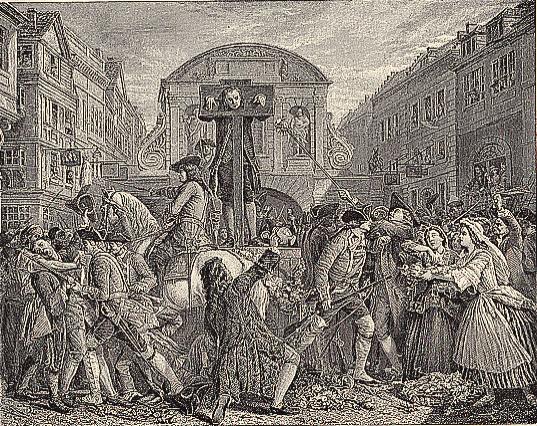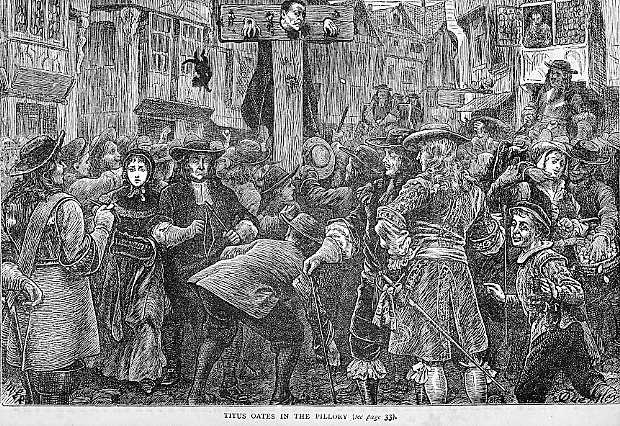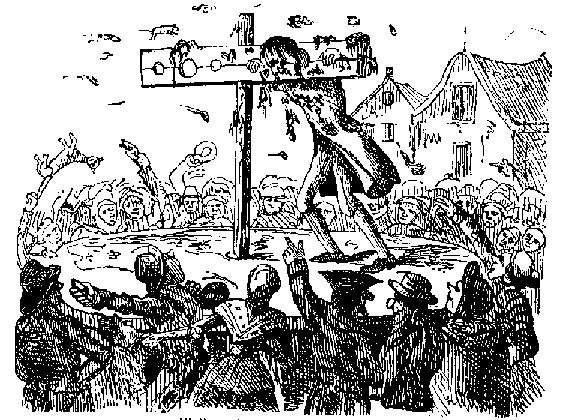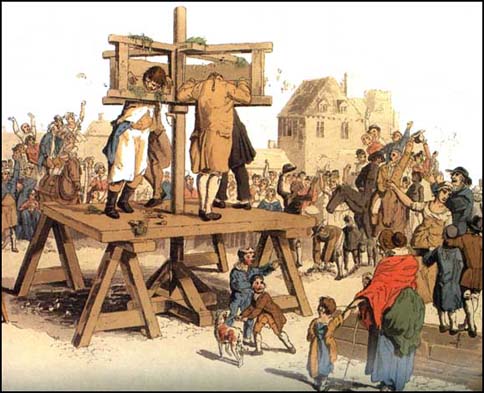At the mercy of the mob
The mob played an important role. Those who gathered round the pillory
were participating in a quasi-legal ritual that was expected to denounce the individual and
uphold the rule of law, as well as protect the moral standards of the community. The crowd was effectively
both judge and jury, and their decisions were absolute.
A significant drawback to stocks and pillories is that the
severity of the punishment depended much on the attitude of
the crowd. How they felt about the crime committed, whether or
not they liked the victim, or simply what mood they were in that
day.
Unlike those convicted of sexual crimes, political offenders
were often received in the pillory as heroes, thereby undermining the moral authority of the law
as public prosecution turned into public recognition. This unpredictability led to the abolition of the pillory in the
19th century, and to the eventual disuse of the stocks.
Charles Dickens observed in “A Tale of Two Cities” that the pillory “inflicted a punishment of which no
one could foresee the extent”.
 On some occasions, the attitude of the mob worked in the
victim’s favour. When the author, Daniel Defoe, was pilloried
for satirising the Government, the crowd was definitely on his
side. They brought him food and drink, showered him with
flower petals, and even chanted a poem composed for the
occasion, entitled “Ode to the Pillory”.
On some occasions, the attitude of the mob worked in the
victim’s favour. When the author, Daniel Defoe, was pilloried
for satirising the Government, the crowd was definitely on his
side. They brought him food and drink, showered him with
flower petals, and even chanted a poem composed for the
occasion, entitled “Ode to the Pillory”.
The crowd could also be remarkably lenient to less celebrated individuals, as
this contemporary newspaper report shows:
"Yesterday at Noon Sarah Thomas stood in the Pillory in the Old Bailey,
opposite to Fleet-Lane, for keeping a disorderly House, pursuant to her Sentence
at the last Quarter Session in Guildhall. The Mob behaved to her with great Humanity,
she standing on the Pillory all the Time drinking Wine, Hot-pot, &c. It was Diversion
to her rather than a Punishment." (St. James’s Chronicle 29-31 October 1761)
But the mood of the mob could be fickle. Sometimes their behaviour would get out of hand,
resulting in the serious injury or death of those being punished. For example, in 1751 two
men called Egan and Salmon were pilloried for
highway robbery prior to their imprisonment. The mob pelted
them with turnips, potatoes, stones etc to such an extent that,
in less than half an hour, Egan was struck dead by a stone, and
Salmon received injuries which later proved fatal.
The fault here arguably lay with the authorities, for using the pillory
for crimes which would normally merit hanging. Serious injuries and death were rare
where the victims were guilty of petty crimes, although minor injuries
caused by hard missiles were commonplace.
Here are some other notorious examples of the use of the pillory:
Titus Oates
 Titus Oates invented a "popish plot", a fictitious conspiracy by catholics to overthrow King Charles II.
As a result of his unfounded accusations, a number of innocent people were executed. When he was found out,
Titus Oates was deemed to merit prolonged punishment.
Titus Oates invented a "popish plot", a fictitious conspiracy by catholics to overthrow King Charles II.
As a result of his unfounded accusations, a number of innocent people were executed. When he was found out,
Titus Oates was deemed to merit prolonged punishment.
According to Chambers Book of Days:
"Found guilty of perjury on two separate indictments, the inventor of the Popish Plot was condemned in 1685 to public exposure [in the pillory] on three consecutive days. The first day's punishment in Palace Yard nearly cost the criminal his life; but his partisans mustered in such force in the city on the succeeding day that they were able to upset the pillory, and nearly succeeded in rescuing their idol from the hands of the authorities.
According to his sentence, Oates was to stand every year of his life in the pillory on five different days: before the gate of Westminster Hall on the 9th of August, at Charing Cross on the 10th, at the Temple on the 11th, at the Royal Exchange on the 2nd of September, and at Tyburn on the 24th of April; but, fortunately for the infamous creature, the Revolution deprived his determined enemies of power, and turned the criminal into a pensioner on Government."
Here is a transcript of the court's sentence upon Titus Oates:
"First, The Court does order for a fine, that you pay 1000 marks upon each Indictment.
Secondly, That you be stript of all your Canonical Habits.
Thirdly, the Court does award, That you do stand upon the Pillory, and in the Pillory, here before Westminster-hall gate, upon Monday next, for an hour's time, between the hours of 10 and 12; with a paper over your head (which you must first walk with round about to all the Courts in Westminister-hall) declaring your crime. And that is upon the first Indictment.
Fourthly, (on the Second Indictment), upon Tuesday, you shall stand upon, and in the Pillory, at the Royal Exchange in London, for the space of an hour, between the hours of twelve and two; with the same inscription.
You shall upon the next Wednesday be whipped from Aldgate to Newgate.
Upon Friday, you shall be whipped from Newgate to Tyburn, by the hands of the common hangman.
But, Mr. Oates, we cannot but remember, there were several particular times you swore false about; and therefore, as annual commemorations, that it may be known to all people as long as you live, we have taken special care of you for an annual punishment.
Upon the 24th of April every year, as long as you live, you are to stand upon the Pillory and in the Pillory, at Tyburn, just opposite to the gallows, for the space of an hour, between the hours of ten and twelve.
You are to stand upon, and in the Pillory, here at Westminster-hall gate, every 9th of August, in every year, so long as you live. And that it may be known what we mean by it, 'tis to remember, what he swore about Mr. Ireland's being in town between the 8th and 12th of August.
You are to stand upon, and in the Pillory, at Charing-cross, on the 10th of August, every year, during your life, for an hour, between ten and twelve.
The like over-against the Temple gate, upon the 11th.
And upon the 2d of September, (which is another notorious time, which you cannot but be remember'd of) you are to stand upon, and in the Pillory, for the space of one hour, between twelve and two, at the Royal Exchange; and all this you are to do every year, during your life; and to be committed close prisoner, as long as you live."
John Waller
 Here is a contemporary newspaper account of the fate of John Waller, who was convicted of robbery and perjury:
Here is a contemporary newspaper account of the fate of John Waller, who was convicted of robbery and perjury:
"Pilloried for perjury, and pelted to death by the populace, 13th June, 1732
This profligate wretch, Waller, to robbery added the still greater sin of accusing the innocent, in order to receive the reward in certain cases attending conviction. The abominable dealer in human blood was tried at the Old Bailey for robbing, on the highway, one John Edglin, and afterwards, under the name of John Trevor, giving a false evidence against the said John Edglin, whereby his life might have become forfeited to the abused laws of the country. On the latter charge he was found guilty.
It appeared, on this memorable trial, that Waller made it a practice to go the circuits as regularly as the judges and counsel, and to swear robberies against such as he deemed fit objects for his purpose, from no other motive than to obtain the reward given by each county for the apprehension and conviction of criminals for highway robberies and other offences therein committed.
The sentence of the Court was, that he should pay a fine of twenty marks, and be imprisoned for the term of two years, and at the expiration thereof to find good and sufficient security for his good behaviour during the remainder of his life; that he do stand twice in and upon the pillory, bareheaded, with his crime written in large characters; and that he do also stand twice before the pillory, likewise bareheaded, one hour each time.
On Tuesday, the 13th of June, 1732, this wicked man was put in the pillory, pursuant to his sentence, at the Seven Dials, in London; where, so great was the indignation of the populace, that they pelted him to death and the day after the coroner's inquest gave a verdict, 'Wilful murder by persons unknown.'"
Sexual offences usually provoked the crowd to demonstrate their extreme disapproval.
Ann Marrow
Here is a contemporary newspaper report about Ann Marrow, who was convicted of fraud and entering into three lesbian marriages:
Pilloried at Charing Cross, 22nd of July, 1777, for marrying three Women
Ann Marrow was convicted at the Quarter Sessions for the city and liberty of Westminster, on the 5th of July, 1777, of going in men's clothes and personating a man in marriage, with three different women (Mary Hamilton, the reader will remember, played off this trick fourteen times), and defrauding them of their money and effects. She was sentenced to be imprisoned three months, and during that time to stand once in and upon the pillory, at Charing Cross.
Agreeably to the pillorying part of her sentence she was on the 22nd of the same month, placed in the pillory; and so great was the resentment of the spectators, particularly the female part, that they pelted her to such a degree that she lost the sight of both her eyes."
Eleanor Beare
On 18 August 1732, Eleanor Beare was tried in Derby for performing illegal abortions, and inciting a man
to murder his wife (for which Eleanor supplied him with poison).
According to The Gentleman's Magazine, "his Lordship summed up the Evidence in a very moving Speech to the Jury,
wherein he said, he never met with a
Case so barbarous and unnatural. The Jury, after a short Consultation, brought the Prisoner in Guilty of both
Indictments, and she received Sentence to stand in the Pillory, the Two next Market-Days, and to suffer dole
Imprisonment for Three Years.
This Day Eleanor Beare, pursuant to her Sentence, stood for the first Time in the Pillory in the Marketplace;
to which Place she was attended by several of the Sheriff's Officers; notwithstanding which, the Populace, to
show their Resentment of the horrible Crimes wherein she has been charged, and the little Remorse she had shown
since her Commitment, gave her no Quarter, but threw such quantities of Eggs, Turnips, Etc. that it was thought
she would hardly have escap'd with her Life: She disengaged herself from the Pillory before her the Time of her
standing was expired, and jump'd among the Crowd, whence she was with Difficulty carried back to Prison."
Vere Street Coterie

In 1810, six men (known as the Vere Street Coterie) were sentenced to the pillory
for homosexual offences. The following contemporary newspaper reports provide a graphic description
of the treatment they received:
"The disgust felt by all ranks in Society at the detestable conduct of these wretches occasioned many
thousands to become spectators of their punishment. At an early hour the Old Bailey was completely
blockaded, and the increase of the mob about 12 o'clock, put a stop to the business of the sessions.
The shops from Ludgate Hill to the Haymarket were shut up, and the streets lined with people, waiting
to see the offenders pass. Four of the latter had been removed from the House of Correction to Newgate
on Wednesday evening, and being joined by Cook and Amos, they were ready to proceed to the place of punishment.
A number of fishwomen attended with stinking flounders and entrails of other fish which had been in
preparation for several days.
The gates of the Old Bailey were shut and all strangers turned out. The miscreants were then brought out,
all placed in the caravan. Amos began to laugh, which induced his companions to reprove him, and they all
sat upright, apparently in a composed state, but having cast their eyes upwards, the sight of the spectators
on the tops of the houses operated strongly on their fears, and they soon appeared to feel terror and dismay.
At the instant the church clock went half-past twelve, the gates were thrown open. The mob at the same
time attempted to force their way in, but they were repulsed. A grand sortie of the police was then made.
About 60 officers, armed and mounted as before described, went forward with the City Marshals. The caravan
went next, followed by about 40 officers and the Sheriffs. The first salute received by the offenders was
a volley of mud, and a serenade of hisses, hooting, and execration, which compelled them to fall flat on
their faces in the caravan. The mob, and particularly the women, had piled up balls of mud to afford the
objects of their indignation a warm reception.
At one o'clock four of them were exalted on a new pillory, made purposely for their accommodation. The
remaining two, Cook and Amos, were honoured by being allowed to enjoy a triumph in the pillory alone.
Upwards of fifty women were permitted to stand in the ring [in front of the pillory], who assailed them
incessantly with mud, dead cats, rotten eggs, potatoes, and buckets filled with blood, offal, and dung,
which were brought by a number of butchers' men from St James's Market. These criminals were very roughly
handled; but as there were four of them, they did not suffer so much as a less number might.
After an hour, the remaining two, Cook and Amos, alias Fox, were desired to mount and in one minute they
appeared a complete heap of mud and their faces were much more battered than those of the former four.
Cook appeared almost insensible, and it was necessary to help him both down and into the cart, whence
they were conveyed to Newgate by the same road they had come. As they passed the end of Catherine Street,
Strand, on their return, a coachman stood upon his box, and gave Cook five or six cuts with his whip.
From the moment the cart was in motion, the fury of the mob began to display itself in showers of mud and
filth of every kind. Before the cart reached Temple Barm, the wretches were so thickly covered with filth,
that a vestige of the human figure was scarcely discernible. They were chained, and placed in such a manner
that they could not lie down in the cart, and could only hide and shelter their heads from the storm by
stooping. This, however, could afford but little protection. Some of them were cut in the head with brick-bats,
and bled profusely. The streets, as they passed, resounded with the universal shouts and execrations of the
populace."
Another newspaper described this incident thus:
"Such was the degree of popular indignation excited against these wretches, and such the general eagerness to
witness their punishment, that, by ten in the morning, the chief avenues from Clerkenwell Prison and Newgate
to the place of punishment were crowded with people; and the multitude assembled in the Haymarket, and all its
immediate vicinity, was so great as to render the streets impassable. All the windows and even the very roofs
of the houses were crowded with persons of both sexes; and every coach, wagon, hay-cart, dray, and other
vehicles which blocked up great part of the street, were crowded with spectators.
The Sheriffs, attended by two City Marshals, with an immense number of constables, accompanied the procession
of the Prisoners from Newgate, whence they set out in the transport caravan, and proceeded through Fleet-street
and the Strand; and the Prisoners were hooted and pelted the whole way by the populace. At one o- clock four of
the culprits were fixed in the pillory, erected for and accommodated to the occasion, with two additional wings,
one being allotted for each criminal; and immediately a new torrent of popular vengeance poured upon them from
all sides.
The day being fine, the streets were dry and free from mud, but the defect was speedily and amply
supplied by the butchers of St. James's- market. Numerous escorts of whom constantly supplied the party of attack,
chiefly consisting of women, with tubs of blood, garbage, and ordure from their slaughter-houses, and with this
ammunition, plentifully diversified with dead cats, turnips, potatoes, addled eggs, and other missiles, the
criminals were incessantly pelted to the last moment. They walked perpetually round during their hour [the pillory
swivelled on a fixed axis]; and although from the four wings of the machine they had some shelter, they were
completely encrusted with filth.
Two wings of the Pillory were then taken off to place Cooke and Amos in the two remaining ones, and although
they came in only for the second course, they had no reason to complain of short allowance, for they received
even a more severe discipline than their predecessors. On their being taken down and replaced in the caravan,
they lay flat in the vehicle; but the vengeance of the crowd still pursued them back to Newgate, and the caravan
was so filled with mud and ordure as completely to cover them.
No interference from the Sheriffs and Police officers could refrain the popular rage; but notwithstanding the
immensity of the multitude, no accident of any note occurred."

[Return to index page]
Designed July - 1997 by pillory@unforgettable.com.
Last modified 24 October 2008.
Copyright © StocksMaster. All rights reserved.
This page hosted by
 Get your own Free Home Page
Get your own Free Home Page
 On some occasions, the attitude of the mob worked in the
victim’s favour. When the author, Daniel Defoe, was pilloried
for satirising the Government, the crowd was definitely on his
side. They brought him food and drink, showered him with
flower petals, and even chanted a poem composed for the
occasion, entitled “Ode to the Pillory”.
On some occasions, the attitude of the mob worked in the
victim’s favour. When the author, Daniel Defoe, was pilloried
for satirising the Government, the crowd was definitely on his
side. They brought him food and drink, showered him with
flower petals, and even chanted a poem composed for the
occasion, entitled “Ode to the Pillory”. Titus Oates invented a "popish plot", a fictitious conspiracy by catholics to overthrow King Charles II.
As a result of his unfounded accusations, a number of innocent people were executed. When he was found out,
Titus Oates was deemed to merit prolonged punishment.
Titus Oates invented a "popish plot", a fictitious conspiracy by catholics to overthrow King Charles II.
As a result of his unfounded accusations, a number of innocent people were executed. When he was found out,
Titus Oates was deemed to merit prolonged punishment.  Here is a contemporary newspaper account of the fate of John Waller, who was convicted of robbery and perjury:
Here is a contemporary newspaper account of the fate of John Waller, who was convicted of robbery and perjury: 
